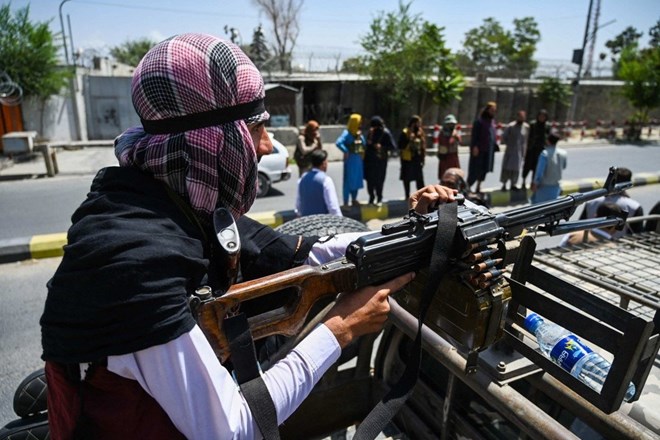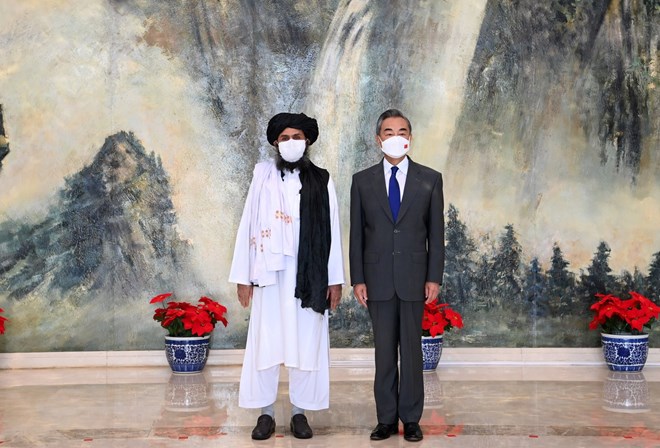Sunday, August 22, 2021

A Taliban fighter mans a machinegun while patrolling a street in Kabul. Photo: AFP
The term “The Great Game” was coined to describe the great power competition between tsarist Russia and the British Empire in Afghanistan during the 19th Century. With the fall of Afghanistan to the Taliban over the weekend, the term is still being used and abused as analysts and others try to divine the future of the country and what other powers might do.
China has been one particular point of interest: tongues began wagging as soon as State Councillor Wang Yi met Taliban co-founder Mullah Abdul Ghani Baradar in Tianjin on July 28 and described the group as a “pivotal military and political force”. Beijing’s statements in the wake of the fall of Kabul, that it “respects the choice of Afghans”, will do nothing to quell speculation about China’s ambitions.
Questions are already being asked about whether the “Graveyard of Empires” will live up to its name by consuming the dragon next. Following the Taliban’s return to power in Kabul, the highly-fluid situation will give rise to several degrees of anxiety for Beijing. China shares the same fears that Central Asian countries have over neighbouring Afghanistan: the rise of Islamic terrorism, a new wave of refugees, and increased narcotics trafficking. The proximity of Afghanistan to the US$63 billion China-Pakistan Economic Corridor represents another problem: it is part of what we can term China’s “Belt and Road of Anxiety”.
While there are concerns in China, there are also opportunities. Beijing has made much capital of the fact that its embassy – along with those of several other nations, including Russia and Iran – has remained open despite Kabul’s fall. Despite a focus on security interests, Beijing could be calculating that staying in-country could bring future benefits, such as in reconstruction.
But speculation that China could play a military role in Afghanistan, including sending troops, are off the mark. In that respect, Afghanistan shares some similarities with another country in China’s orbit: Somalia. The African nation is part of a bold Chinese geopolitical bet for a high-risk, high-reward undertaking, and could shed some light on what Beijing could do next in Afghanistan besides promoting an Afghan-led and -owned solution.

Chinese State Councillor Wang Yi meets Taliban co-founder Mullah Abdul Ghani Baradar in Tianjin. Photo: Xinhua
The activities of terrorist and criminal organisations continue to be a pox on Somalia. Long considered a failed state, Somalia continues to be engulfed by ethnic conflicts, endemic piracy and terrorist activities, and frequent bursts of violence. The effects of climate change are making matters worse – the country is among those most vulnerable to drought in the world.
Despite all this, geography is destiny, and Somalia’s coast along the strategic Gulf of Aden overlooks one of the world’s most-travelled sea lanes. With the Bab al-Mandab chokepoint nearby, Somalia is a pawn in a new “great game” – one that is unfolding in the Horn of Africa.
On the Arabian peninsula across the Red Sea, the United Arab Emirates, Saudi Arabia, and Qatar are all strengthening their economic and security relations with Somalia. Turkey is in the mix as well, operating the country’s air and seaports as well as training its special forces troops. China, for now, has limited its engagement to diplomacy and economics. Beijing has stuck to its prognosis that economic development is a panacea for any security problem, but that might not last much longer as jockeying for influence continues in the pivotal region.
In Somalia, Chinese soft power flows from university scholarships which allow more than 1,000 Somali students to study in mainland China, to Covid-19 aid, among other efforts. Since 2008, China has sent PLA Navy warships to escort commercial vessels, mostly Chinese, to protect them against the pirates that infest the Gulf of Aden. These efforts contain an element of risk: the Jazeera Palace Hotel in Mogadishu was attacked by the militant al-Shabab group in July 2015, resulting in the death of a People’s Armed Police officer attached to the Chinese Embassy.
China is nonetheless firmly fixed on establishing a footprint in Somalia before the country is stabilised. A key tool for this effort is the use of Chinese private security contractors to protect the country’s investments there. The embassy, for example, has contracted its security to local militias. Chinese private security companies in the country for anti-piracy operations and VIP close security protection are eager for a bigger piece of the pie – they are bidding aggressively in Beijing for contracts to provide security for diplomatic staff.
Beijing’s experiment with private security contractors to lay the groundwork for stabilising Somalia will be a litmus test for its broader participation in Afghanistan. Though Chinese security contractors lack sophisticated equipment or battle-tested capabilities – of the kind deployed by Russian private military companies operating in the African continent – they can provide valuable intelligence to Beijing and a boots on the ground presence that the People’s Liberation Army cannot.
According to Chinese official statements, there have been clear signs of progress in Somalia over the past few years, and China is eager to benefit from the peace dividend. Beijing is banking on Somalia’s return as a maritime logistics hub, thus making it a key component in the Maritime Silk Road component of the belt and road.
If the private security contractor blueprint in Somalia continues to move this progress along, Beijing could be encouraged to duplicate this approach in different complex environments, from Afghanistan to the Sahel, that are part of China’s Belt and Road of Anxiety.
Afghanistan and Somalia share similarities in terms of geostrategic positioning, as well as high risks. The latter could have belt and road credentials in the long run, Afghanistan does not. Nevertheless, one has lessons for the other as both sides affect Beijing’s core interests in different ways – Kabul because of its proximity to China’s borders and Mogadishu because it is a key node in the belt and road’s expansion in Africa.
The successful implementation of investments and security stabilisation measures taken in Somalia may well help China kill two birds with one stone.
Dr Alessandro Arduino is principal research fellow at the Middle East Institute at the National University of Singapore, specialising in the roles played by private military contractors and technology in modern warfare.